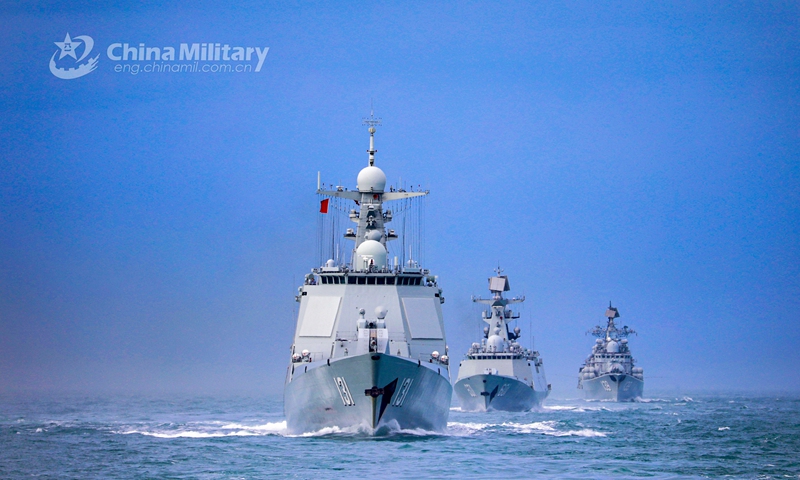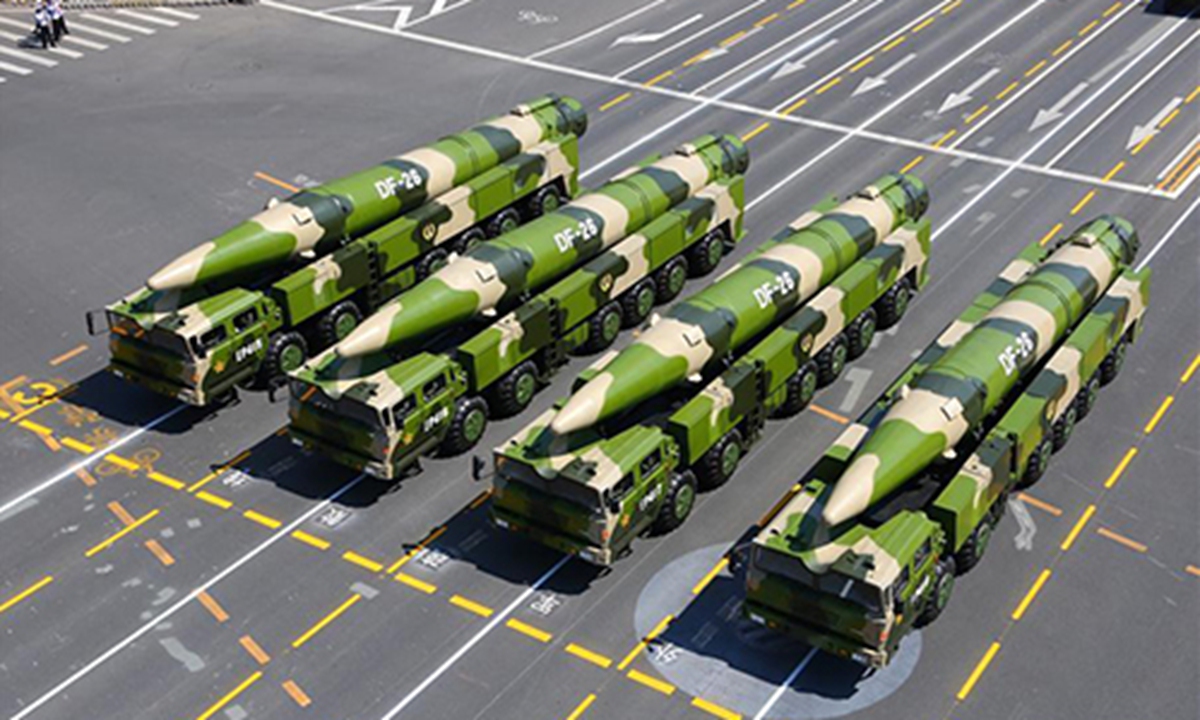PLA holds large drills amid military threats

A naval fleet comprised of the guided-missile destroyers Ningbo (Hull 139) and Taiyuan (Hull 131), as well as the guided-missile frigate Nantong (Hull 601), steams in astern formation in waters of the East China Sea during a maritime training drill in late January, 2021. Photo:China Military Online
At a time when the US is holding large-scale military exercises targeting China, and several countries including the UK, Germany and India plan to send or have already sent warships to the South China Sea, China announced it will hold a military exercise from Friday to Tuesday in the South China Sea, setting up a vast navigation restriction zone some observers said resembles a drill conducted last year in which the Chinese People's Liberation Army (PLA) reportedly conducted live-fire "aircraft carrier killer" anti-ship ballistic missiles exercises.
While details on the upcoming drill remain speculative, it will serve as a response to the recent provocations, demonstrating that China has "hunting rifles ready against the wolves" that hunger for China's core interests, experts said.
China will hold a military training in the South China Sea from Friday to Tuesday, and other vessels are prohibited from entering the navigation restriction zone, read a notice released by the Maritime Safety Administration on Wednesday.
The coordinates provided in the notice show that the exclusion zone stretches from waters off the southeast of Hainan Island to a majority of waters around the Xisha Islands, meaning that the exercise area is larger than even the Hainan Island, the National Defense Newspaper reported on Thursday.
The notice did not give more details on the exercise, but a Taipei-based news agency reported that the PLA launched anti-ship ballistic missiles in the South China Sea in a similar exercise last year.
Last year's exercise, conducted from August 24 to 29, also featured a navigation restriction zone in almost the same location and of similar size announced by the Maritime Safety Administration.
US media outlets then quoted US defense officials as saying that China launched four medium-range ballistic missiles into the South China Sea in that exercise, landing in an area between Hainan Island and the Xisha Islands. This was widely interpreted by overseas media as the PLA testing anti-ship ballistic missiles, presumably "aircraft carrier killers" - the DF-21D and the DF-26.
Chinese Defense Ministry spokesperson Senior Colonel Wu Qian said at a regular press conference on August 27, 2020 that recent Chinese military exercises were routine and did not target at any country.
Based on publicly available information, it could be said this year's PLA drill in the South China Sea will likely feature anti-ship exercises, Xu Guangyu, a senior adviser to the China Arms Control and Disarmament Association, told the Global Times on Thursday.
Both ship-based and land-based anti-ship missiles, including the missiles in the DF series, have a long range, and that is why the exercise requires such a large area, Xu said, noting that this year's exercise could be an enhanced version based on the one conducted last year.
Song Zhongping, a Chinese military expert and TV commentator, told the Global Times on Thursday that the PLA is advocating the concept of joint operations featuring multiple military services, which could include the PLA Rocket Force, and another live-fire anti-ship ballistic missile exercise is possible this year.
If not, the exercise would likely feature joint maritime and aerial forces, Song said.
"These exercises have already become routine near Chinese waters, with the aim of honing the PLA's capabilities to fight and win wars under realistic combat scenarios," Song said.
Fu Qianshao, a Chinese military aviation expert, told the Global Times on Thursday that while another "aircraft carrier killer" test is possible, it is still difficult to tell only by the navigation restriction notice.
It could instead feature ship-based, submarine-based or aircraft-based anti-ship missiles, or ship-based air defense missiles, Fu said, noting that the number of participating warships and warplanes could also be a factor to the large exercise zone.
China's second aircraft carrier, the Shandong, was in the South China Sea for exercises last week, US media outlet thedrive.com reported, citing foreign satellite images.

File photo taken on Sept. 3, 2015 shows DF-26 missiles attending a military parade in Beijing, capital of China. It has been a big year for China's military as the People's Liberation Army (PLA) is to celebrate its 90th birthday. As Aug. 1, the birthday of the PLA, approaches, the country's army has shown how much its military capacity has grown and how committed it is to maintaining world peace. The PLA has come a long way since its birth during the armed uprising in the city of Nanchang on August 1, 1927, when it had only 20,000 soldiers. Ninety years later, the country boasts 2 million servicemen, according to a national defense white paper titled China's Military Strategy, published in 2015. Besides the growth in numbers, the PLA has armed its soldiers with world-class equipment. As of June 2017, the Chinese military had participated in 24 UN peacekeeping missions, sending 31,000 personnel, 13 of whom lost their lives in duty. Since 2008, the Navy has dispatched 26 escort task force groups, including more than 70 ships for escort missions in the Gulf of Aden and off the coast of Somalia. More than 6,300 Chinese and foreign ships have been protected during these missions. (Xinhua)
Pointed warning
No matter what training subjects will be featured in the upcoming exercise, it comes at a time when China is facing military provocations from the US and several other countries.
The US kicked off on Tuesday the Large Scale Exercise 2021 naval and amphibious exercise billed as the largest of its kind in 40 years, US military media outlet the Stars and Stripes reported, saying that it aims to send a message to Russia and China.
Featuring units in 17 different time zones, the exercise attempts to show that the US can simultaneously address challenges in the Black Sea, eastern Mediterranean Sea, South China Sea and East China Sea and shut down efforts to spread US military forces thin, and that the US can prevent China from reunifying the island of Taiwan or landing on the Diaoyu Islands, the report quoted a US scholar as saying.
The US has also been holding the Large Scale Global Exercise 21 with UK, Australian and Japanese forces since Monday, the US Indo-Pacific Command said.
A UK aircraft carrier strike group led by the HMS Queen Elizabeth carrier sailed through the South China Sea on Monday, with a German warship, the Bayern frigate, setting sail on the same day also for the South China Sea.
India is another country that plans to send warships to the South China Sea, as four Indian destroyers and a frigate will be deployed for a two-month period to Southeast Asia, the South China Sea and the western Pacific, Reuters reported on Wednesday, citing the China-India border question since clashes last year.
Against this backdrop, China's large-scale exercise in the South China Sea is a pointed response that warns these provocateurs, Song said.
They are like hungry wolves that have been frequently stirring up troubles and challenging China's core interests, Song said.
"China holding military exercises is like readying a hunting rifle and striking back at the wolves," Song said, noting that a good rifle is necessary.
Xu said that the PLA's exercise has perfect timing, as it will show on a strategic level that China is not afraid of anyone, and even warships from a hundred countries coming to the South China Sea will not shake its determination to safeguard national sovereignty and security.
Of all those countries, the PLA exercise is a warning to the US, which is the one that rallied the gang, Xu said.
It is a common understanding among foreign and Chinese military analysts that the PLA has the upper hand if a war breaks out on China's doorsteps, be it in the South China Sea, the East China Sea or the Taiwan Straits, even against powerful opponents like the US and its allies.
The large-scale exercise in the South China Sea is not the only drill the PLA will conduct, as the Maritime Safety Administration has announced several more drills in the Bohai Strait, the Yellow Sea, and other locations in the South China Sea.
From Monday to August 13, China and Russia will hold the Zapad/Interaction-2021 exercise in the Qingtongxia Combined Arms Tactical Training Base in Northwest China's Ningxia Hui Autonomous Region, which will feature more than 10,000 personnel, multiple types of aircraft, artillery pieces and armored equipment with the aim of testing joint reconnaissance, early warning, electronic information attack and strike capabilities.
In addition to displaying China' and Russia's roles as major powers in jointly safeguarding regional peace and stability in Central Asia following the US' irresponsible troop withdrawal from Afghanistan, the joint exercise will also enhance military cooperation under the context that both countries are facing suppression by the US, a Chinese expert on international affairs who requested anonymity told the Global Times.
Photos
Related Stories
Copyright © 2021 People's Daily Online. All Rights Reserved.










